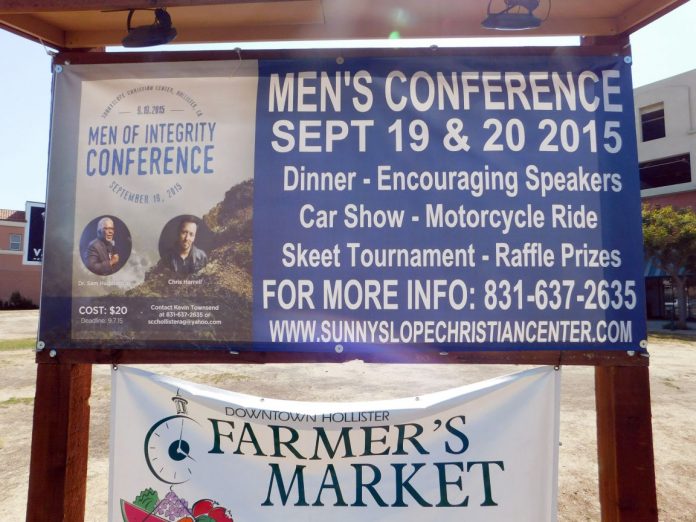
Allowing religious organizations to use a downtown public signpost for event advertisements—like a church men’s conference promotion currently displayed—means the City of Hollister must provide the same access for other types of groups “that could be quite controversial,” argued the co-founder of the national Freedom From Religion Foundation.
Annie Laurie Gaylor, co-founder of the Wisconsin-based nonprofit Freedom From Religion Foundation, said local governments could enact policies refusing religious speech in public forums—its allowance the result of a changing tide in the higher courts starting in the 1980s—and that there is a potential consequence in not doing so.
“If they are taking a church function like this, then they would also have to permit an atheist group equal access, or a satanic group,” said Laurie Gaylor, adding how the organization always recommends that cities adopt more-narrow policies related to religious speech in public forums.
That prospect didn’t appear to change the view of Hollister Mayor Ignacio Velazquez, who supports faith-based groups’ use of the rotating sign board on the city-owned grassy lot at the corner of Fourth and San Benito streets.
“That may be the case eventually,” Velazquez conceded about atheists or Satanists using the prominently placed public post. “But does that mean we prevent all the others that are doing positive things from promoting what they’re doing?”
Those outlooks represent a wider debate occurring for decades about the appropriateness, and legality, of religious speech in public forums. While many staunch critics of such religious speech in public forums abide by the so-called separation of church and state mantra, others argue on the side of all-encompassing free speech in what’s ultimately a matter of diverging perspectives on the U.S. Constitution.
Two monumental U.S. Supreme Court decisions in the 1980s set the stage for government entities to allow religious speech on taxpayer-owned property, as Hollister does.
In 1980, the high court struck down a Kentucky law mandating schools to display the Ten Commandments, arguing it violated the First Amendment clause prohibiting governments from favoring one religion over another or from favoring religious over non-religious beliefs, according to the Pew Research Center. In 1984, according to Pew, the court ruled that a Christmas nativity scene in a Rhode Island municipal square was constitutionally acceptable because it “recognized the historical origins of the holiday, one that has secular as well as religious significance.”
Since then, Pew noted in its 2007 research paper titled “Religious Displays and the Courts,” the Supreme Court and lower courts have issued “unpredictable rulings, approving some displays while ordering others to be removed.”
Since the City of Hollister doesn’t expressly forbid religious groups to take part in the two-week sign rotation along San Benito Street or on other public platforms, it must allow organizations following any belief system on the signpost as long as they meet basic requirements. The city’s longstanding policy, enacted by the council about 15 years ago, includes requirements that the sponsoring organization is a nonprofit, located in San Benito County, and advertising for an event held in the community and open to the public, according to Geri Johnson, the recently retired city clerk.
The city takes applications for the sign rotation at the start of each year. Some upcoming organizations scheduled to use the city signpost for ads—a banner across San Benito Street follows similar guidelines for nonprofits—include the San Benito County Fair, Red Ribbon Run and Relay For Life, according to the assistant city clerk, Christine Black.
Johnson recalled other religious organizations using the public signpost over the years including the Hollister United Methodist Church, First Presbyterian Church and local affiliations sponsoring the “Silver Ring Thing” presentations at San Benito High School promoting abstinence.
“The council-adopted policy, I think, has been a good one,” Johnson wrote in an email to the Free Lance.
Hollister’s Kevin Townsend agrees. As pastor of Sunnyslope Christian Center, promoting its upcoming “Men of Integrity” conference on the city sign from Sept. 6 to Sept. 15, Townsend expressed his support for the rotating sign program.
“I think it’s awesome that there’s a space where people can see the different events that are happening in our community,” said Townsend, who launched the annual men’s conference in 2000 after starting as senior pastor.
He pointed out how the men’s conference set for Saturday and Sunday draws 200 to 300 attendees each year and includes such activities as a Harley-Davidson run, car show and skeet shooting contest along with inspirational speakers.
Townsend mentioned how Sunnyslope has used the same city signpost with effectiveness to promote the church’s annual Thanksgiving feed as well.
“There are so many great organizations in Hollister,” Townsend said. “I think it’s awesome.”
Laurie Gaylor from the Freedom From Religion Foundation, however, argued that laws allowing such religious speech in public forums are out of line with intentions of the nation’s founding fathers.
“I think public forum law has gone way too far,” she said. “Framers of the Constitution were very wise to keep religion out of government.”
Laurie Gaylor said it’s often the case in a small town, for instance, that there is no established atheist organization.
“So then you have the government where it’s just the opportunistic majority that gets to use the lot and signage provided by all of us taxpayers,” she said.









